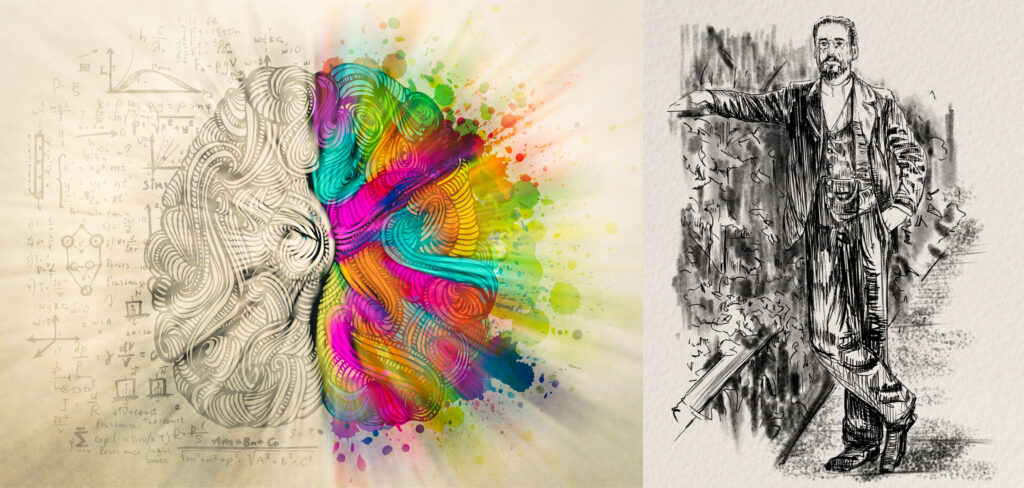A new scholarly article explores the ongoing debate surrounding the classification of mental disorders as brain disorders and proposes the field of psychological humanities as a potential way forward.
The article, co-authored by Jussi Valtonen and Bradley Lewis, argues that the classification of mental disorders as brain disorders has led to a reductionist view of mental illness that overlooks the complex social and cultural factors that contribute to mental health. Their article also highlights the importance of the psychological humanities. This field combines the humanities and social sciences with medicine and public health to provide a more comprehensive understanding of mental health.
Valtonen and Lewis argue that psychological humanities can help bridge the gap between the reductionist view of mental illness as a brain disorder and the more holistic view that considers the social and cultural factors contributing to mental health. Valtonen (a novelist and neuropsychologist) and Lewis (a psychiatrist with a Ph.D. on Foucault) use the works of Russian author Anton Chekhov to illustrate their point.
Chekhov, who was a physician as well as a writer, explored the complex relationship between mental health and social factors in his stories and plays. The authors argue that Chekhov’s work provides a valuable perspective on mental health that is often overlooked in the brain disorders debate.
“Chekhov stands out, both through his art and his dual engagement with medicine and literature, as a pluralistic advocate of both science and literature. Chekhov, who worked in a time before the methodological conflict had hardened, used an approach to mental differences in his stories that values the sciences but also exemplifies the possibilities of the arts and humanities,” Valtonen and Lewis write.
“In this way, Chekhov can be a guide for mental health research and practice at a time when biological answers are turning out to be much more complicated than early proponents of neuroimaging had hoped. Finally, generalizing from Chekhov’s contribution, we develop an arts-and-humanities approach to mental health and mental difference through the articulation of interdisciplinary mental health humanities as a significant contributor to future mental health research, education, and practice.”
Valtonen and Lewis point out that the debate over whether mental disorders can be explained purely in neurobiological terms has been raging for over a century. While some researchers have advocated for natural science methods to measure cognitive and neuroscience variables, others have argued that this approach is limited in its reach. Moreover, recent research has shown that neurobiology-based interventions for mental disorders have largely failed, leading to a call for a broader perspective.
 Despite optimism in the early days of functional neuroimaging techniques, the pathology of mental disorders remains elusive. While some researchers believed that neuroimaging studies would provide a new scientific breakthrough in understanding mental illness, the use of techniques such as positron emission tomography (PET) and functional magnetic resonance imaging (fMRI) have not yielded any consistently identifiable brain activation patterns for mental health conditions such as depression.
Despite optimism in the early days of functional neuroimaging techniques, the pathology of mental disorders remains elusive. While some researchers believed that neuroimaging studies would provide a new scientific breakthrough in understanding mental illness, the use of techniques such as positron emission tomography (PET) and functional magnetic resonance imaging (fMRI) have not yielded any consistently identifiable brain activation patterns for mental health conditions such as depression.
The authors argue that the psychological humanities, or mental health humanities, can move us beyond thinking of mental disorders as a narrow problem of brain tissue, cells, and molecules, toward thinking of it as an evolving, ever-changing challenge for society at large. To this end, the arts and humanities should be included as a full and respected partner in the ongoing work of understanding and improving our mental lives.
The article discusses Anton Chekhov’s short story “A Nervous Breakdown,” which explores the impact of hiring a sex worker on a law student named Vasilyev, who experiences a breakdown after being taken to a brothel by his friends. The story highlights Chekhov’s unique perspective as both a physician and a writer, which allows him to capture the nuances of the human experience in a way that is not easily abstracted or summarized.
The story begins with Vasilyev’s friends convincing him to go out for the night, despite his reluctance to visit a notorious street known for its sex trade. While at a restaurant, Vasilyev envies his friends, wishing to let himself go and live as they do. When they eventually arrive at the brothel, Vasilyev is shocked by the banality of prostitution and becomes increasingly unsettled as he fails to make sense of the women working there. He feels guilty about his role in exploiting the women and becomes overwhelmed by the complexity of the issue.
After returning home, Vasilyev becomes consumed with despair, terror, and thoughts of self-harm and suicide. His friends take him to a psychiatrist, who questions him about his family’s medical history and eventually becomes fascinated by the fact that Vasilyev’s mother was a singer and actress. Vasilyev becomes exasperated with the line of questioning, insisting that his illness is not hereditary.
Chekhov’s story highlights the importance of understanding the particularity of the human experience rather than reducing it to a case history or abstracting it for interpretation. The story also emphasizes the importance of empathy and the devastating impact of exploitation and power imbalances. Through his dual perspectives of art and science, Chekhov offers a unique and nuanced view of the world beyond traditional disciplinary boundaries.
Valtonen and Lewis argue that this short story by Chekhov highlights the shortcomings of clinical psychiatry, particularly in its adherence to reductionist practices and the biomedical model. The psychiatrist only asks predetermined questions and prescribes drugs without considering Vasilyev’s individual experience or the sociopolitical factors contributing to his distress.
Chekhov’s story emphasizes the need for an expanded frame of understanding that includes sociological, psychological, biological, political, spiritual, and aesthetic factors, along with interpretive processes for understanding them. The article suggests that moving past a narrow biomedical natural science model is necessary for mental healthcare to be effective.
The article also discusses how Vasilyev’s mental difference is portrayed in a way that challenges traditional pathologizing views of mental health. Vasilyev’s heightened sensitivity to social suffering and yearning for justice is seen as a valuable maladjustment rather than a pathology. Like Martin Luther King Jr., Vasilyev’s approach to his maladjustment is spiritual, and his sensitivity is viewed as a gift that can trigger social change. However, the article also notes that Vasilyev’s sensitivity can be a source of difficulty and may result in symptoms, suffering, and disability.
“The injustice that concerns him is not just a social problem; it is a political problem,” Valtonen and Lewis write. “It is a political problem that has become a personal problem. But unlike common uses of a biopsychosocial model, Chekhov does not see Vasilyev’s sensitivity and maladjustment to these political problems as psychopathology in any straightforward way. Political problems need people who are maladjusted to the norm, who are sensitive to the plight of the oppressed and subordinated, and who yearn for a better world.”
The authors argue that Chekhov’s portrayal of Vasilyev’s mental difference creates meaning-making options beyond pathologizing models. It helps counterbalance the currently predominant view of psychological distress removed from its political, spiritual, and aesthetic context.
Chekhov’s approach to mental health exemplifies how the psychological humanities can contribute to a broader understanding of mental health. The article suggests that the humanities offer a distinctive knowledge that cannot be achieved through other approaches and contribute to individual and collective happiness.
The arts and humanities can contribute to happiness and well-being at the individual and collective levels in three ways, according to the authors.
- They can offer a deeper understanding of happiness and the relationship between psychological happiness and societal well-being.
- They can help develop a person’s character, explicitly cultivating skills such as interpretation, openness, and tolerance, leading to an increased understanding of the human condition.
- The arts and humanities can bring pleasure and well-being through experiences such as reading, listening to music, or viewing art. Although not everyone may experience these benefits, the arts, and humanities can still offer a richer and more accurate account of happiness than is recognized in most of the current economic and psychological literature on the subject. Additionally, the character development aspect of the arts and humanities is particularly critical for psychotherapy work.
The mental health field is expanding beyond traditional scientific approaches and embracing the humanities and arts. Instead of asking whether mental illness is real or a myth, researchers and practitioners are now questioning who gets to decide what mental health knowledge and practices are created and who is included or excluded in this process. By incorporating diverse perspectives, disciplines, and methods of knowing, mental health care can become more democratic and just. The arts and humanities bring in new voices and advocate for democracy, and they also have intrinsic value and add to a good life.
The field of psychological humanities is emerging as a way forward, allowing for a multiplicity of approaches that include both natural science and the psychological humanities. By creating communities that include mad pride activists, scholars, and practitioners in the arts and humanities, mental health research, education, and practice can be expanded and improved.
Overall, “The Brain Disorders Debate, Chekhov, and Mental Health Humanities” provides a thought-provoking exploration of the ongoing debate surrounding the classification of mental disorders as brain disorders and highlights the importance of a more comprehensive understanding of mental health that takes into account the complex social and cultural factors that contribute to mental health.
****
Valtonen, J., Lewis, B. The Brain Disorders Debate, Chekhov, and Mental Health Humanities. J Med Humanit (2023). https://doi.org/10.1007/s10912-023-09786-1 (Link)















The playwrites, poets and authors have always understood much more than any psychiatrist.
Report comment
Indeed. The arts give meaning and expression to the human experience, whereas psychiatry destroys what it means to be human.
And “psychotherapy” caricatures human relationships.
Report comment
Good article.
The arts and humanities embrace and express the reality of human suffering in ways that are incredibly healing.
Neuropsychiatry is a haven for the heartless, and for those unable to accept the vagaries of life.
Report comment
Art, humanities and psychiatry do have something thing in common: all are unwisely placed on pedestals.
Living should be revered, not someone’s rendition of it.
Report comment
Birdsong, books and works of art can actually help people survive. James Baldwin, who was himself a very deep writer, said:
“You think your pain and your heartbreak are unprecedented in the history of the world, but then you read. It was Dostoevsky and Dickens who taught me that the things that tormented me most were the very things that connected me with all the people who were alive, or who ever had been alive.”
Novels, short stories, plays and poems can also tell us about crucially important things we have not personally experienced.
Report comment
Absolutely. But I’m more committed to honoring the human being from which all art springs.
Report comment
Obviously. But most psychiatric patients don’t have a grammar school education and every psychiatrist with one already knows this. Pathos isn’t only to be found in Russian literature and fine art. Music and movies that speak to people today are just as powerful. Watching Orange is the new black lifted me from depression where Chekhov would not. Psychiatrists always recommend Ulysses or The brothers karamazov or the history of the Pelleponesian war but never anything that wouldn’t feel like homework and merely make the patient feel misunderstood. Not to mention the right-brain maleness of it all. Women don’t need to be encouraged by a man to feel empathy for prostitutes! What works for men does not speak to women and often patronises and harms us further. Do not presume it gives insight into the human condition. It’s the male condition.
Report comment
I agree that much of what’s labeled “great art” is not relatable, and that women’s perspective is often ignored or silenced. And art definitely attracts a lot of snobs.
To me, art is just another form of expression, to communicate soul to soul, to make the unconscious conscious.
Report comment
Russian literature does speak to “people today” and one does not need a grammar school education to appreciate it. I am saddened by the idea that “people today” can be interested only in very recent films and books.
If one finds a novel too daunting, one can start from a short story. “Ulysses” is actually much more difficult than Chekhov or Dostoyevsky. “The History of the Peloponnesian War” is a historical work which should not be compared with novels and short stories. I also completely disagree with the view that Chekhov and Dostoevsky represent “right-brain maleness” and “do not speak to women”.
Report comment
What speaks to people is entirely personal, and often can’t be anticipated. And I’ve no idea what “right-brain maleness” means.
Report comment
… the link to the paper didn’t work for me …
This is of course a valid argument. It makes much more sense to see the subject of “mental health” as a humanity, and not a hard science.
This position has been argued since the early 1950s (as far as I know, perhaps much earlier). I have never seen anyone in the academic world mention those arguments. In fact most act like they never existed; that this is some sort of brand new idea that they just came up with. It is getting to the point where I see this as a form of intellectual arrogance, or self-imposed ignorance.
Of course the human condition involves more than the condition of our brains! But beyond that, we have known about reincarnation (the transfer of personality between bodies) for a long time, and many other similar studies have demonstrated that the personality (and thus the mind, or the memory) is detachable from the body and so the brain. For us to continue to mince words about this only prolongs our attainment of more workable solutions.
Report comment